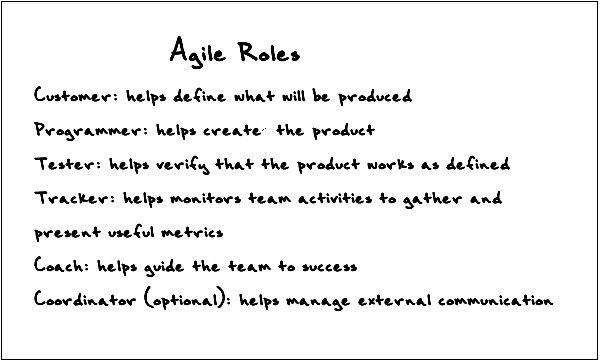Some of you might be surprised that there are no farm animals on this card. We'll talk about that later.
You'll also note that each role definition is preceded with the word "helps." Everyone on an agile team can act as any role at any given time, helping the team toward its ultimate goal of producing quality product.
In agile, roles are just that, roles. We don't look to protect our role from being usurped. While we are most comfortable playing in our primary role, we have no qualms about stepping into other roles as needed or appropriate. A tester might act as a tracker to gather useful team metrics; a programmer might assist the customer and testers in defining acceptance criteria for a story; a manager might help execute any remaining manual acceptance tests; and so on.
Extreme Programming (XP) originally designated two roles, programmer and customer (for whom XP described little--it is extreme programming after all). Each camp had specific rights, to protect each camp's interests against likely infringements by the other. A bit divisive? Indeed. You will be hard-pressed to find much remaining literature that mentions "XP Rights."
Within the programmer camp, XP eschewed specialists and hierarchies, fostering instead experts and team collaboration. But things other than programming and steering as a customer still needed to be done. Various adjunct needs, such as coaching and tracking, emerged. Who would do these things? These part-time needs were fulfilled by XP team members (customers or programmers) shifting in and out of secondary roles.
Proponents of Scrum (which predates XP a bit) were never so trusting in a teams' ability to self-manage, so they introduced the Scrum master, whose job is to keep the team on track. As for XP, the reality of human behavior brought its lofty goals down a peg, more so as Agile took off. Organizational interests and self-preservation took over. The concept of a self-organizing, title-ignoring team threatened HR, project managers, managers, and others who had vested interests in promoting and maintaining specific titles. In an attempt to keep us from falling back into isolationist and divisive behavior, Kent Beck began referring to the collection of all team members as "the whole team," instead of discussing specific roles.
Today, the agile organization doesn't usually look terribly different than the pre-agile organization, except within some programming teams. You'll still hear long-standing, specific names for specific customer roles, such as "business analyst," "product manager," "UI design specialist," "subject matter expert (SME)," and "stakeholder." But on the programming side of the fence, a team working within an open workspace and pairing usually has lost any real concern over titles and artificial divisions such as "front end programmer vs. back-end programmer." Since these roles are temporary, it is futile and undesirable to to tie hierarchical positions or increased benefits to them.
It is best for us to concentrate more on putting out quality product, and least on relative positions. We understand that it may not be realistic in your organization to shed your title, but you should still consider the ego-less organization a general direction to move toward. Sometimes simply thinking that there are no titles can help you find an answer to your problems.
Astute readers will note that "manager," "project manager," and "Scrum Master" do not appear on this list. We have instead substituted "team coordinator," someone who buffers the day-to-day development team from outside interference and distraction. A team coordinator can communicate scheduling issues, handle incoming requests, and smooth interpersonal problems. Within Scrum, this team coordinator also takes on the responsibility of enforcing the rules, something that a team is certainly capable of doing on their own. We suggest that the best Scrum Masters plan their own obsolescence: Their primary job should be to help us mature to the point where the team no longer needs a Scrum Master.
The lack of official leaders and managers in agile is off-putting to some. We've noted that most software teams do not suffer from a shortage of management, but a drastic overage as different departments try to exert control over the isolated "programmers" and "testers." In an agile team we come together as a team, and the work has us busy enough that little traditional management is necessary.
As far as the chicken and pig roles that some of you might have expected to see on this card: Everyone we've met on a well-functioning agile team has been unsurprisingly human. We don't believe people who might have something important to say should be stifled. If someone says inappropriate things at inappropriate times, we muster the courage to ask them to take it elsewhere. "Chicken" was deliberately chosen as a derisive moniker, the spirit of which has no place on a real team. (We quote Jeff Sutherland here, because his original blog post has been archived and may soon rightfully be buried entirely: "People who are not committed to the project and are not accountable for deliverables at the meeting do not get to talk. They are excess overhead for the meeting. ... Whatever we call them it should have a negative connotation because they tend to sap productivity. They are really suckers or parasites that live off the work of others. Sorry to be political [sic] incorrect but others should come up with a euphemism that conveys the right balance between being "nice" and communicating clearly that eavesdroppers must minimize their impact on the productivity of the team." Perhaps the goal is laudable, but the sentiment is so wrong as to be repulsive.)

No comments:
Post a Comment
Note: Only a member of this blog may post a comment.